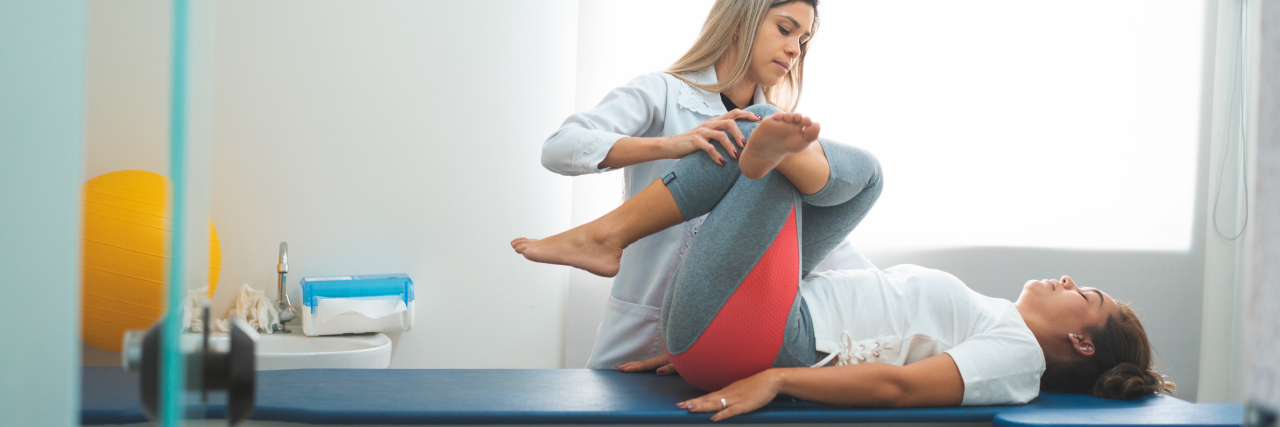I recently decided to start physical therapy again after years of ignoring physical therapists, avoiding physical activity and refusing to treat my stiffness, pain, and fatigue. At just 26 years old, I’ve already spent several years experiencing the physical deterioration past physical therapists warned me about, and I know it’s time to start taking a more proactive approach to my physical health. So the moment an orthopedist prescribed me physical therapy, I was eager to start improving my strength and flexibility.
My first physical therapy appointment was an hour-long evaluation, in which my new physical therapist tested my range of motion and examined my gait. After taking several laps up and down a long hallway, stretching my body in every way imaginable and secretly wondering if my range of motion was “good” for someone with cerebral palsy, I was finally done moving, and my PT began explaining my treatment plan.
I listened intently as she described the types of muscle groups I needed to learn how to engage. But then, she uttered a single sentence that struck me deeply.
“Since you’re not here to rehab an injury and don’t necessarily have a baseline, we’re going to focus on improving your strength in your lower leg and making your gait more efficient.”
Prior to that moment, I had never thought about the fact that I don’t have a definitive physical baseline, but right then, it occurred to me that I’m not like many other twentysomething physical therapy clients. While most people come into physical therapy with a sense of how their bodies “should” engage and strive to return to that level of functionality, I’ve never had a “normal” range of motion, so there’s no level of “able-bodied” that could indicate that I’m “back where I was before.” Instead, my physical therapy goals exist to make life with a disability feel more physically manageable and less painful — and they’ll remain long after I leave physical therapy.
My lack of a physical “baseline” is further complicated by the fact that my physical condition fluctuates. Some days, I’m pain-free and have energy to spare, but other days, I feel so achy and fatigued that the prospect of leaving my bedroom feels like a chore. Even on my “good” days, though, I still notice the stiffness in my affected leg and constantly compare it to the way my unaffected leg moves unencumbered. On the easiest days with my cerebral palsy, I almost feel like my affected leg moves typically, but those days are rare, and using them as a “baseline” for how my body “should” move feels unrealistic, especially considering the frequent fluctuations in how I feel physically.
To the extent that I do have a “baseline,” it’s quite possibly unique to me. Every person with cerebral palsy is affected so differently — even with the same diagnosis or prognosis — that I could be the only one who physically experiences this specific level of functionality on any given day. While many people with similar cerebral palsy diagnoses are affected similarly, the specific mechanics of their bodies and the places in which they experience the most spasticity can vary widely, which can make the process of creating physical therapy goals extremely challenging.
The reminder that my physical “baseline” is singular and atypical — if it exists in the first place — was bittersweet. Although I was genuinely looking forward to making progress in physical therapy, it was a stark realization that as much as I try to deflect the truth, there is no “all better” in my life with a physical disability. I don’t have the luxury of walking out of physical therapy after six weeks of sessions and being “fully functional” again. No matter how fervently I try, my gait will never be perfect, and I’ll have to fight to maintain my current physical abilities every day of my life.
Not having a physical “baseline” sometimes feels hopeless, as though not being able-bodied renders any effort towards better physical health completely useless. But as much as it’s tempting to ruminate about how I don’t have a sports injury that will be fixed with a few weeks of hard work, I know that I’m still making the best decision for my health. I don’t have a physical “baseline” because I’ve been physically disabled since birth, and it’s extremely frustrating to cope with, but I’m still going to try my hardest to make my body stronger than it is now.
Getty image by MesquitaFMS.

